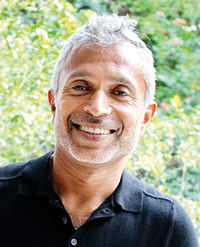Drawn from the ‘hidden recesses’ of Ashok’s mind

Ashok Ferrey
Now entering its thirtieth year, the Gratiaen Prize for Sri Lankan writing in English announced its 2021 shortlist at an online event last Monday. While we do miss those buzzing denouements the suspense is there in the online event, new names and old juxtapose.
Making it to the 2021 shortlist are:
Uvini Atukorala for A Place Called Home – (unpublished manuscript)
Ashok Ferrey for An Unmarriageable Man – (published novel)
Ciara Mandulee Mendis for The Lanka Box – (unpublished manuscript)
Rizvina Morseth de Alwis for Talking to the Sky - (unpublished manuscript)
In our series on shortlisted authors beginning this week, we look at the alchemy of each work and writer heading up to the prize, the legacy of Michael Ondaatje who established it with the money won for the 1992 Booker Prize for his novel The English Patient, commemorating the name of his mother, Doris Gratiaen.
It’s an idea delicious like a box of dark chocolates from Fortnum and Mason: a novel by Ashok Ferrey set in London, the metropolis he captures with wit and much warmth; filled with his love for this great city he knew as a youth – its immigrants and idiosyncrasies; its thousand cosmopolitan worlds; its Sloane Rangers and cockney sparrows.
But despite the book’s chic cover packed with respectable, ‘aproned’ London houses, Ashok Ferrey’s latest novel shortlisted for the Gratiaen, The Unmarriageable Man, was not actually inspired by London itself.
The story of Sanjay de Silva, “under the thumb of a controlling Sri Lankan father, having lost his English mother at an early age”, is at the heart of Ashok’s fifth book to be shortlisted for the Gratiaen. It is the death of that tyrannical father that releases Sanjay from Colombo to London, where the adventure begins.
He becomes the “first Asian builder in London” and falls in love with a woman his mother’s age, “known within the acid-tongued Sri Lankan community as ‘a hooker of the very highest class, with royal connections’.”
The book was drawn from the ‘hidden recesses’ of Ashok’s mind. Sanjay has Ashok’s mind, if not his appearance and behaviour.
The 80’s London it’s all set in, is exactly as Ashok knew it: “with heaters you had to put coins into; and the lingering smell of ‘ulu haal’ in the corridors”.
However the London Sri Lankan characters, Ashok concedes, were invented – apart from the woman in the full-length mink who “came up to me once and give me her number without bothering to ask my name. (Sad to say, I carried that scrap of paper around with me for months but never acted on it!)”.
The germ for the book was planted 22 years back when Ashok’s father passed away. The grief of it he found unable to deal with. Only of late has he been able to face it “somewhat dispassionately”.
In the book however the grief was too harrowing so he had to layer it with another era of his life: when he was happiest – as a young builder in London.
So it is a story “of youth and love, of empowerment and achievement; and the sheer joyous feeling all young people have that you have somehow, miraculously, found yourself at the centre of the universe, at absolutely the right time in your life!”
Despite not having won the Gratiaen, Ashok, since Colpetty People in 2005, has known a steady ride with his seven books, maybe as popular as any resident English writer anytime.
Ashok says it is still a wonder to him that people want to read his books. But not everyone likes every book. While Professor Lakshmi de Silva called The Professional (2017) a ‘lost masterpiece’, some others Ashok know ‘would gladly light the stove with its pages’.
The Unmarriageable Man too, he says, is not a crowd-pleaser. Ashok says you would “either love it or hate it”.
Woven into the book is Ashok’s love for buildings. London houses though terraced and identical and ‘not very beautiful taken on their own’- taken as whole streets are vistas of delight; whereas ‘in Sri Lanka every house is distinctive and idiosyncratic, but taken as a whole the street can be an incoherent jumble!’
The most difficult thing about writing this book was mining those hidden veins of grief- “that still run rich like iron ore in the desert”.
“There are passages in the book I find almost impossible to read even today. A few months back I was rehearsing with a friend in London for the launch there. At a certain point I found I simply couldn’t go on. I was so ashamed of myself when that happened!”
Given that he more than any other resident writer deals with characters from across the world, I prod him about national identities, and on whether people have such a thing at all, he comes up with these portentous ‘Ferrey lines’:
“We’re forever being told all people are the same, all men are equal. Hah! We know only too well that when an American speaks he speaks with the supreme confidence and assurance of 200 years of unparalleled prosperity behind him. Any national is only the sum of several thousand years of events behind him, the total of every thought, feeling, word his fellow countrymen ever uttered before him. This can’t fail but forge a distinctive national characteristic.”
Finally confronted about his preference for ghosts that are funny rather than scary, Ashok wryly admits this is ‘a bad habit’ of his.
“This book too, has a foul-mouthed, homophobic misogynist ghost who steals all the scenes, giving everyone a bad time…
“OK, so I solemnly promise never to write another ghost story again,” he adds gravely. “Happy?”
Searching for an ideal partner? Find your soul mate on Hitad.lk, Sri Lanka's favourite marriage proposals page. With Hitad.lk matrimonial advertisements you have access to thousands of ads from potential suitors who are looking for someone just like you.


